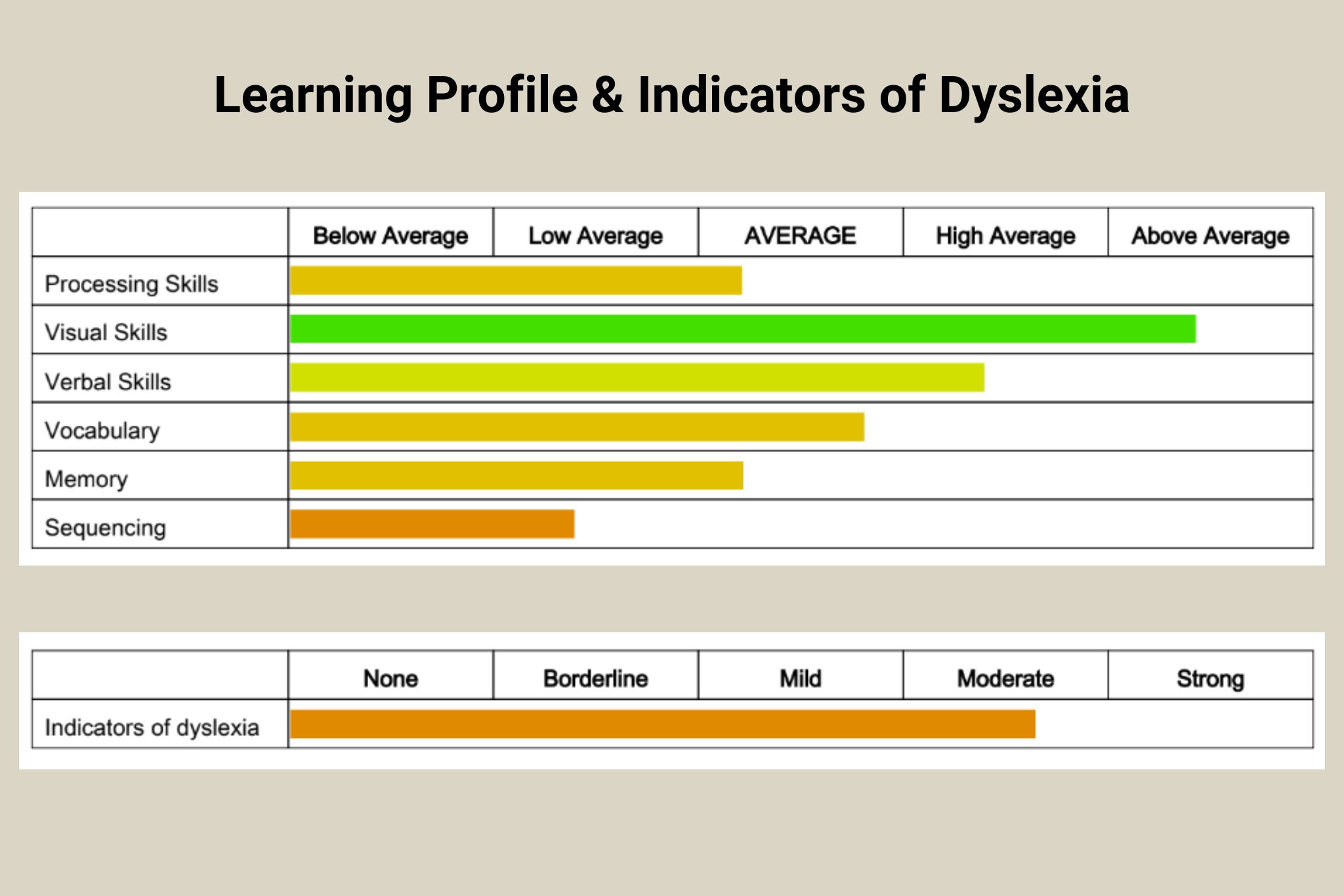
QuickScreen Online Dyslexia Testing Platform
Are you looking for a cost-effective and proven online dyslexia testing solution for your students, new recruits and team members?
QuickScreen provides organisations with a dashboard to manage distributing a 6-part dyslexia test to any number of candidates, with detailed individual reports.
The test is suited to fluent English-speaking individuals (aged 17+) – typically located in the UK, Australia, New Zealand, USA and Canada.
NEW! When you purchase a licence for the QuickScreen online dyslexia testing platform, there is now an option to choose an additional reading skills test, currently free of charge.
Why use QuickScreen for Online Dyslexia Testing?
- An independent research study confirmed a high accuracy level of 93% and a strong predictive capacity for dyslexia of 97%
- This online dyslexia testing solution includes Verbal Skills, Visual Skills, Vocabulary, Memory, Sequencing and Processing Skills
- Comprehensive text and graphical reporting with all the scores, a cognitive profile of SpLD/Dyslexia and associated learning differences, with recommendations for support
- Accessible on PC, Mac, IPad or Android tablets – not mobile phones
- Multiple tests can be carried out simultaneously and be managed within an organisational dashboard
- A simple and affordable annual licence – with an initial 2 month free trial for online dyslexia testing
- Used by many universities, public and private sector organisations for thousands of candidates each year
- Free additional and optional reading skills test for all users of the QuickScreen online dyslexia testing solution
- Option of utilising the QuickScan Dyslexia Questionnaire as an initial screener (see more below)


Online Dyslexia Testing & Reporting Functions
- As a rough guide it take approximately 5-10 minutes to complete each of the 6 online dyslexia testing sections – so typically 1 hour in total, or a little longer for those who find literacy to be a problem area
- The 6 elements can be completed in any order and at different times.
- Candidates can just log back in to their account and complete the next section when they are ready
- The Processing Skills section includes a reading passage which is pitched at the higher end of GCSE level – it may be challenging for some, but not impossible. There is an adult-graded spelling test
- The report is more thorough than other online dyslexia testing options because it includes a cognitive profile, examines underlying skills, adult level literacy skills and speed of processing
- The Processing Skills report includes speed of silent reading, memory span for spoken language, spelling, punctuation, capitalisation and overall comprehension.
- A statistical Table of Results provides an overall dyslexia quotient. See more information about the test bandings
- Reports can be issued on completion or withheld to be available at a consultation.
- The QuickScreen online dyslexia testing platform also allows administrators to add comments to and sign off a report before it is sent to a candidate.
How to Register for a Free Trial
It is quick and easy to register your organisation for a free trial of the QuickScreen online dyslexia testing solution.
- Click the button below and then simply choose ‘Register’
- On the next screen select ‘Organisation’ as the registration option
- Set up your dashboard
- Start assigning tests to individuals from your dashboard and reviewing candidate reports
If you have any questions, or would like to discuss an affordable annual licence for the QuickScreen online dyslexia testing platform, please contact us.


Which Online Dyslexia Testing Solution is right for my Organisation?
We offer two online dyslexia testing solutions – QuickScreen and QuickScan.
You can choose to utilise one or both products depending on your requirements.
Some organisations use QuickScan to initially undertake a wider scale screening programme, followed by the QuickScreen test for those showing signs of SpLD for a more comprehensive online dyslexia testing solution.
Please contact us to chat through which options could work best for you.
“We absolutely love QuickScreen for online dyslexia testing . The best feature is the report – it is much more user friendly for the learner to understand and digest. The fact that these can be sent direct to the learner is also an added bonus for us, the ability to do this remotely is perfect.”
UK Armed Forces
"I have been very pleased with the QuickScreen online dyslexia testing programme over the academic year. I believe that it has enhanced our screening and subsequent full diagnosis provision."
UK University
More Testimonials for the QuickScreen Online Dyslexia Testing Solution
“So pleased to have your help to support our employees. The data from the online dyslexia testing can tell us so much and allow us to offer specific help where needed.”
County-Wide Public Sector Organisation
“THANK YOU. I am really pleased to see that your online dyslexia testing programme is always under review and developing. It gives me great confidence in the product.”
College Assessor
“I would just like to say that I have been very happy with the service and products; Quickscan and QuickScreen during my time at University. I would recommend them as effective screening tools for dyslexia and other SpLDs.”
Study Support Tutor, UK University
“Following a number of discussions with one of our mentees, we found QuickScreen for online dyslexia testing. We completed the assessment which was very thorough and the results indicated moderate indicators of dyslexia with significant processing difficulties. This confirmation of processing difficulties was a massive relief for the person concerned, as for so many years she had believed that she was ‘stupid’. The recommendations were particularly useful and going forward it has given her the courage to declare her difficulties and will enable her to get the support she needs. Many thanks.”
Family Support Organisation, UK
“Pleased to report the software is working well for our online dyslexia testing.”
Study Support Tutor at University
“The online dyslexia testing procedures are proving to be a valid method for the identification of adults with learning difficulties both of a dyslexic and more general nature. They enable group and individual assessments to be efficiently carried out in terms of cost and time allocations. The individual profiles obtained assist with subsequent consultations in the design of appropriate strategies to cope better with difficulties of a personal, intellectual or educational kind.”
County Educational Psychologist
Frequently Asked Questions (FAQ’s)
Please consult The QuickScreen Guide which is available and downloadable from your organisational dashboard – section 4 Troubleshooting – this gives a clear instruction on what to do in several situations (pages 12-15) including correcting or adding names, non- receipt of emails and re-setting the password.
When organisations register to use the QuickScreen online dyslexia testing solution with their staff and employees, or universities with their staff and students, it has always been recommended that this is done under the overall supervision of a dyslexia trained assessor, with whom they will be able to consult if need be and put together a training programme where appropriate.
Contact our lead dyslexia consultant to assist with any queries arising regarding the online dyslexia testing – be it test content, an individual result or technical anomaly.
QuickScreen for organisations combines the cost effectiveness of online dyslexia testing with the benefit of comments from the assessor. It therefore combines the mechanics of testing with the specialist’s experience and personal interaction with the candidate.
The report generated from the QuickScreen online dyslexia testing solution is detailed and very practical – similar to the test a specialist tutor would compile.
It is clearly set out, comprehensive and, where required, will give you suggestions for how to build on existing skills with specific recommendations for future action.
This is followed by bar graphs showing your results in all the items and gives you three conclusions:
- The first is whether there are any indicators of SpLD/dyslexia and this is qualified by giving the reasons why this conclusion has been reached
- The second is overall literacy skills level in relation to the candidate’s other results, so they are given a reference point based on their own general performance
- The third is overall speed of processing throughout a variety of tasks when using both language and symbols, which once again is measured against the candidate’s own level of performance in the other tasks.
There is also a Statistical Table of Results (which can be included or withheld by the assessor) which provides a dyslexia quotient in percentage terms together with a banding. See more information about the test bandings.
Once the candidate knows the level of SpLD/dyslexia they can be supported to plan strategies to utilise strengths and find ways of dealing and managing the problem areas. This can be done more effectively with the information provided in the detailed report, so that relevant aids to learning can be suggested, such as spelling programmes, scanner pens, reading techniques etc.
Furthermore, having an understanding of the candidate’s speed of processing will allow them to focus on selecting the right allocation of time, concentration and working environment to get the best results.
Whilst the QuickScreen online dyslexia testing platform cannot be compared to a one-to-one assessment it certainly has some additional features which in our opinion are very relevant to adult SpLD/dyslexia testing.
Whilst in standard assessments a single word spelling test will be administered – we do also provide this information but in a different way. The dictation task (part of the Processing Skills test) has a 40 word graded spelling test embedded within the passage and this is the basis of the spelling score.
However, the words are presented using a method of testing called ‘spontaneous spelling’. Research has found this to be a more authentic way to test a dyslexic adult’s spelling ability by replicating spelling as a natural component of writing meaningful sentences, rather than a single word spelling test. We consider this provides a more meaningful picture of the candidate’s spelling performance.
Furthermore, our online dyslexia testing solution has a built-in speed of processing component – in that the candidate’s speed of function throughout a number of the test items is calculated.
Research has shown this to be highly relevant in predicting an individual’s ability to cope with the volume of information they need to process in order to work or study effectively.
A person can be a slow processor and not be dyslexic, equally if someone has dyslexia as well as being slow in processing information, then our research, together with clinical observation over a number of years, confirms that the support required will be far greater than in the case of a person with dyslexia but with speed of processing skills within the average range. (See research section)
QuickScreen is verified and proven, we regularly undergo independent research. Our latest statistical survey confirms findings from previous years, regarding the strong association between the QuickScreen online dyslexia testing solution and an independent dyslexia assessment.
A number of clients have asked us if we can confirm if QuickScreen is a screener and not to be considered as a diagnostic test (even though it is largely based upon and proven to have similarities with diagnostic tests) to receive reasonable adjustments for national examination and assessment processes.
Our response is that QuickScreen’s online dyslexia testing is not to be taken as a final diagnosis in the same way as an assessment report provided after a one-to-one assessment with an educational psychologist, or certified dyslexia tutor, mainly because it is an online test and therefore unmonitored.
However, if the online dyslexia testing is supervised by an assessor and signed off then the result is quite assured.
Currently, however, it is not sufficient for gaining DSA funding at university.
Because QuickScreen’s online dyslexia testing provides accurate guidance for the assessor when considering workplace adjustments as part of their workplace needs assessment, it is proving to have a definite and valuable role to play in the process.
Yes, the report in part or total can be shared with consent. It is used in full within the public sector organisations and it tends to be used (sometimes without the table of results) in some colleges and universities.
Equally, the front and the last page and table of results can be used as a summary report.
QuickScreen is intended for anyone who is experiencing difficulties with aspects of literacy and processing. However, if someone is dyslexic, but is effectively using strategies and achieving high levels of literacy attainment, through ability, performance, a positive attitude and thorough application, there are still likely to be some aspects of the test which will present even well compensated adults with a challenge. With QuickScreen’s online dyslexia testing, you will identify those dyslexic characteristics that are often not possible to disguise.
For example, speed of function cannot be artificially altered, and memory and sequencing skills, together with fluency in reading can all be improved, but the test will flag up if these specific areas are still at variance with the candidate’s own overall ability.
A highly proficient candidate with residual dyslexia will very likely get a borderline or compensated result on the test.
Adults with post graduate qualifications have completed this test and it has been able to identify any aspects of learning which are still partially unresolved. The scope of our online dyslexia testing is such that it can be used for candidates with a wide spectrum of ability and academic achievement.
All the QuickScreen online dyslexia testing sections are fully explained and have video instructions, which it is advisable to watch. Also each test starts with a couple of practice items.
The literacy section (part of the Processing Skills test) is geared to also cater for those who have more severe difficulties, so that they can carry out the practice item in full, they can re-do it if need be and if they cannot cope with the main dictation then their report will still offer them feedback at an intermediate level.
If someone is anxious about doing online dyslexia testing it would be helpful to have an adult in the room with them for a bit of support.
It is at times a positive for the candidate when they find that there are certain tasks which they might be better at than they anticipated.
However, in some cases it would probably be preferable to have a personal interview and test with an assessor rather than working online, but most people are actually more at ease with online dyslexia testing.
QuickScreen online dyslexia testing is not recommended for anyone who is struggling at a basic level of literacy. Ideally candidates need to have the equivalent of a good GCSE level of proficiency in English.
It can, however, be taken by candidates whose first language is not English. Things particularly to look out for would be, lack of fluency in vocabulary and verbal reasoning, and in such cases the slow processing and/or slow reading levels may be more likely due to language difficulties than to SpLD/dyslexia.
However, the QuickScreen online dyslexia testing can still be used to identify dyslexia in the cases where even without good literacy levels or fluency in English, low scores on two key tests – namely memory and sequencing – would often provide an indicator of SpLD/dyslexia.
Equally, the visual skills test, which is not dependent on fluency in English will flag up particular strengths or difficulties in visual and analytical skills – a key component in ability.
So where the vocabulary or verbal reasoning may be deflated by English language difficulties, visual skills can provide an indicator of ability.
This, however, may not provide a full picture of ability – particularly in cases where the individual happens not to be good at solving visual puzzles.
For further testing the reading skills module would provide a very detailed and useful guide about the candidate’s fluency in English.
QuickScreen’s online dyslexia testing is more relevant for use at 6th form level, as it is a post GCSE test. The Senco at the school will be the person who can assist and will have carried out their own assessments.
However, the QuickScreen test results can further confirm what is known by the Senco regarding the learning needs of the individual candidate and provide them with more helpful information and recommendations.
The subtests in QuickScreen’s online dyslexia testing report that can provide additional relevant information are the candidate’s levels of silent reading speed and handwriting speed, together with typing speed and indicators of difficulties with processing.
Since this is a computer based online dyslexia testing platform and not a diagnostic assessment, such as one that is administered by a specialist tutor or educational psychologist, we do not issue a user manual detailing the psychometric properties of the tests.
The calculations are programmed based on a detailed matrix upon which the test has been constructed. It uses a statistical analysis of individual profiles with scaled scores and percentile rankings together with descriptor bandings.
The dyslexia quotient is an overall percentage rating of the severity of difficulties but is modified where current performance is of a high standard.
There is much research that has been carried out by Pico Educational Systems, as well as by organisations who use the test.
The original basis of the online dyslexia testing programme was developed under the auspices of a PhD thesis (at Leicester University) and a government funded project (at Kingston University) and overseen by a committee of dyslexia specialists. Some of the key dyslexia tests have been correlated with other diagnostic tests and are well established.
All the background research is documented and available in the Research section of our website.
The most recent statistical study (2021) confirms a strong correlation between the QuickScreen SpLD/dyslexia online dyslexia testing platform and independent dyslexia assessments.
The rationale for the screener and the individual tests are all documented in the completed PhD Thesis entitled ‘Dyslexia in Higher Education’ which is available in the online library of Leicester University here.
There have been many studies carried out over the years and the participants drawn from a wide range of adults (aged 17-55+) from a number of universities, FE colleges, 6th form colleges, public sector organisations and general members of the public – therefore a fairly wide range of age, gender, ethnicity and levels of education.
The QuickScreen online dyslexia testing solution is regularly upgraded and the subject of independent statistical surveys.
In a statistical study that was completed (May 2021) which aims to provide an overall accuracy rate for the test, together with a cut- off percentage to be used as a guideline – between dyslexia and non- dyslexia profiles.
The overall accuracy for QuickScreen as an online dyslexia testing platform has been recorded at 93%. See the research section of our website for the latest information.
There has been a lot of increased public awareness over the years about SpLD/dyslexia, as well as a focus on the positive aspects of dyslexia so that the earlier stigma (of simply dismissing people with dyslexia as being somehow to blame for their difficulties – not working hard enough etc) should be somewhat alleviated.
This has all been welcome – however the BDA acknowledged that 40 years after first indicating that pupils were slipping through the net, to the current day, that the same situation is still the case, with a similar number of children still being let down by the education system.
Now SpLD/dyslexia is seen as one of a number of learning differences along the spectrum of neurodiversity – whereby not only difficulties but also specific strengths and talents are being acknowledged among this group.
Many adults are still looking at ways to get tested, that are not financially prohibitive, who for a variety of reasons have not had the opportunity to get an insight into their learning profile.
Our mission is to ensure that everyone can access a dyslexia screening service to discover if they are dyslexic.
We provide a much needed online dyslexia testing service, at costs that are so reasonable, that nobody is left in a situation of not being able to afford to find out if they are dyslexic.
Need Help?
Please get in touch if you have any technical or general support questions about the test or your test results. We’re happy to help and will do our best to respond within 24 working hours.
Call +44 (0)20 8674 9571 between 9 am and 5 pm, Monday to Friday, UK time, or
Email [email protected] or use the form on our contact page.
